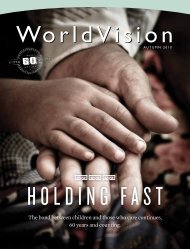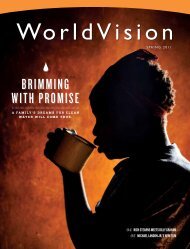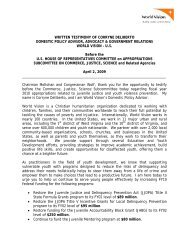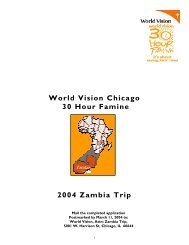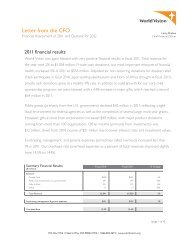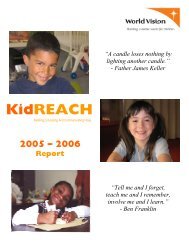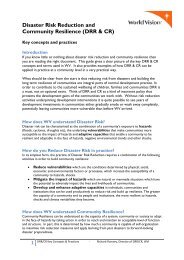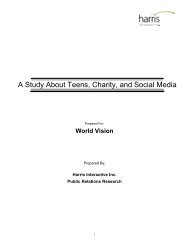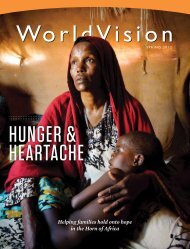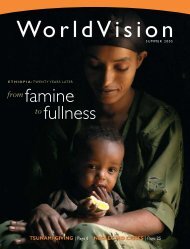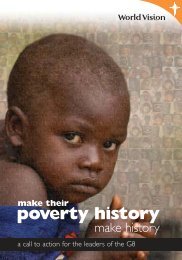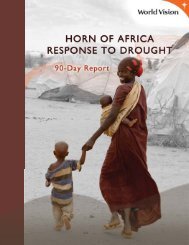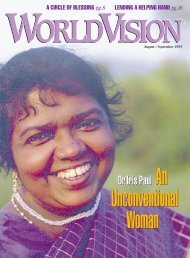Spring 2013 - World Vision
Spring 2013 - World Vision
Spring 2013 - World Vision
You also want an ePaper? Increase the reach of your titles
YUMPU automatically turns print PDFs into web optimized ePapers that Google loves.
<strong>World</strong><strong>Vision</strong><br />
spring <strong>2013</strong><br />
Dominican girls discover their true potential<br />
20 Praying for Women and Girls | 22 Women Stand Against Prejudice
Step<br />
into Her <strong>World</strong><br />
Building a better world for children<br />
NEW on My <strong>World</strong> <strong>Vision</strong>: Meet Eugenia,<br />
a sponsored child in northern Tanzania, who is<br />
eager to show you her world in a series of<br />
stunning videos that bring sponsorship to life.<br />
Visit myworldvision.org/sponsorshipatwork.<br />
get closer.<br />
world vision<br />
President Richard E. Stearns<br />
Editorial Director Jane Sutton-Redner<br />
Editor-in-Chief Eugene Lee<br />
Managing Editor Nathalie Moberg<br />
Associate Editor Elizabeth Hendley<br />
Senior Writer James Addis<br />
Contributing Writer Kari Costanza<br />
Photo Editor Jon Warren<br />
Photo Researcher Abby Stalsbroten<br />
Production Manager Karen Latta<br />
Design & Production Journey Group Inc.<br />
<strong>World</strong> <strong>Vision</strong>, a free quarterly publication,<br />
affirms people responding to God’s call to<br />
care for the poor by providing information,<br />
inspiration, and opportunities for action,<br />
linking them with children and families in<br />
nearly 100 countries where <strong>World</strong> <strong>Vision</strong><br />
ministers. In an effort to be careful stewards<br />
of our resources, this publication<br />
costs 57 cents a copy to produce.<br />
We welcome your comments or address<br />
changes. Contact us at: <strong>World</strong> <strong>Vision</strong><br />
magazine, P.O. Box 9716, Federal Way,<br />
WA 98063-9716. Email us: wvmagazine@<br />
worldvision.org. To request to be taken off<br />
our mailing list, email us or call toll-free<br />
877.596.0290.<br />
All Scripture quotations, unless otherwise<br />
indicated, are taken from the Holy Bible,<br />
New International Version®.<br />
NIV®. Copyright ©1973, 1978, 1984, 2011<br />
by International Bible Society. Used by<br />
permission of Zondervan. All rights reserved.<br />
Member, Evangelical Press Association and<br />
Association Media & Publishing<br />
NEW options to email your child:<br />
Choose a fun design for your email background<br />
and even attach your favorite photo. Send some<br />
encouragement to your sponsored child today.<br />
Sign in at myworldvision.org/emailmychild.<br />
jon warren/<strong>World</strong> <strong>Vision</strong><br />
www.worldvisionmagazine.org<br />
Find the latest stories, news, and photos<br />
www.facebook.com/worldvisionmagazine<br />
Connect with others who like <strong>World</strong> <strong>Vision</strong><br />
www.twitter.com/<strong>World</strong><strong>Vision</strong>Mag<br />
Follow us for news from <strong>World</strong> <strong>Vision</strong> partners<br />
Find all this and more on My <strong>World</strong> <strong>Vision</strong>!<br />
myworldvision.org 1-800-678-2168<br />
866.332.4453 Copyright © <strong>2013</strong> by <strong>World</strong> <strong>Vision</strong>, Inc.
SPRING <strong>2013</strong><br />
world vision magazine • Volume 16 • Number 3<br />
contents<br />
On the Cover<br />
Sponsored girls play near<br />
sugarcane fields in the<br />
Dominican Republic.<br />
abby stalsbroten/world vision<br />
abby stalsbroten/world vision<br />
12<br />
Departments<br />
04<br />
05<br />
28<br />
30<br />
31<br />
fROM THE PRESIDENT<br />
Caring for girls today makes a difference for generations.<br />
FRONTLINES<br />
A former communist spy plants churches in Cambodia;<br />
more refugees flee violence; and an expert answers<br />
questions on gender inequity.<br />
WHERE ARE THEY NOW<br />
A former sponsored child advocates for<br />
Kenya’s Maasai people.<br />
INSPIRATION<br />
Five loaves and two fish: God asks us to bring all<br />
we have to him.<br />
RETROSPECT<br />
Two sisters in India are beacons of inspiration<br />
to girls around them.<br />
above<br />
Beri Enecia, left, with<br />
her grandmother and<br />
mother.<br />
20<br />
Pray for women<br />
around the world<br />
to overcome the<br />
obstacles they face.<br />
Features<br />
12 God Made Me Free<br />
In the Dominican Republic, girls are reaching their<br />
God-given potential with the help of dedicated <strong>World</strong><br />
<strong>Vision</strong> staff.<br />
20<br />
Walking With the<br />
<strong>World</strong>’s Women<br />
The odds are stacked against women and girls at<br />
every stage of life in many developing countries.<br />
Pray about the challenges they face.<br />
22 Pride and Prejudice<br />
Though South Africa is one of the continent’s most<br />
developed nations, 5.6 million residents are HIV<br />
positive—including two women choosing to live<br />
fruitful lives despite the disease’s stigma and shame.<br />
world vision • Page 3 • spring <strong>2013</strong>
from the president<br />
Make a Difference for Generations<br />
by rich stearns<br />
If you knew you could change<br />
the future by writing one letter,<br />
to whom would you write<br />
A head of state A celebrity<br />
A CEO of a multinational<br />
corporation<br />
During my book-writing sabbatical last<br />
summer I paused to write one letter.<br />
I chose to write to a girl born into a<br />
poor family in the mountains of Bolivia.<br />
Why Because I believe that empowering<br />
a girl today is the best way to make a<br />
difference for future generations.<br />
I’d met Ruth on a trip last year. Her<br />
story was striking. She had a powerful passion<br />
to pursue her education and become<br />
—Proverbs 13:12<br />
a lawyer so she could help abused women<br />
and children. Yet the obstacles Ruth faced<br />
were enormous.<br />
Abandoned by her father at birth, Ruth grew up in a<br />
mud-brick home with a dirt floor and no running water or<br />
electricity. She came of age in a community where very few<br />
ever make it to high school, especially girls. Yet with <strong>World</strong><br />
<strong>Vision</strong>’s help, Ruth was able to attend elementary school.<br />
Unfortunately, women are devalued in Bolivia, as in many<br />
places around the world where girls are often prevented from<br />
going to school.<br />
Compared to boys, a girl growing up in the developing<br />
world is more likely to die before her fifth birthday. She is<br />
less likely to receive adequate food or healthcare; she will<br />
have fewer economic opportunities; and she is more likely to<br />
be forced to marry before the age of 16. If these conditions<br />
weren’t enough, little girls today are too often victims of<br />
sexual and domestic abuse as well.<br />
Ruth’s education led her to become a student activist.<br />
Domestic abuse and alcoholism are major problems in her community.<br />
So Ruth led a small group to petition the government to<br />
open a legal office in the area where women and children could<br />
report abuse and find help and protection.<br />
From this experience Ruth developed her own vision to<br />
become a lawyer and advocate for women and children who suffered<br />
abuse. But her family moved; she was made to live with an<br />
“Hope deferred makes<br />
the heart sick, but a longing<br />
fulfilled is a tree of life.”<br />
jon warren/world vision<br />
Rich talks with Ruth about her future.<br />
uncle; and her mother pulled her out of<br />
school, forcing Ruth to get a job.<br />
When I met Ruth, she was 19. Against<br />
all odds, this girl, born into poverty in the<br />
mountains of Bolivia, had finished high<br />
school and enrolled in a university. She<br />
was still pursuing her dream to become a<br />
lawyer, to transform a nation.<br />
Ruth is now getting the extra help<br />
she needs to finish her studies, but her<br />
struggle continues. In my letter to her, I<br />
told Ruth, “I believe in you. You have a<br />
dream, and I just know that you will never<br />
quit until you have reached it.”<br />
Because women and girls so powerfully<br />
affect their families and communities,<br />
there is no “anti-poverty intervention”<br />
more effective than supporting a girl. The former U.N.<br />
Secretary General Kofi Annan put it this way: “To educate girls<br />
is to reduce poverty.”<br />
In my next book, Unfinished (to be released April 30), I tell<br />
the story of Rahab, the prostitute who helped the spies from<br />
Israel enter the city of Jericho. Rahab would have faced similar<br />
obstacles to those confronted by many girls today. Yet her risky<br />
actions for God continue to have an impact. Centuries after her<br />
act of courage, we are told in the Gospel of Matthew that she<br />
was a direct ancestor to King David and eventually Jesus Christ.<br />
Caring for girls and giving them a voice is one of the most<br />
powerful tools <strong>World</strong> <strong>Vision</strong> has to help poor communities—<br />
not just today, but for generations to come. ●<br />
rich's new book, Unfinished, challenges Christians to<br />
complete the mission Jesus gave to his church. Unfinished will<br />
be available April 30.<br />
world vision • Page 4 • spring <strong>2013</strong>
News and notes about the work of world vision around the globe<br />
frontlines<br />
MUHAMMAD ALI/<strong>World</strong> <strong>Vision</strong><br />
f<br />
FOOD FOR THOUGHT<br />
Around the world, books open young imaginations to a world<br />
of possibilities. Yet millions of children never know the joy of<br />
reading. For girls growing up in northwest Pakistan, education<br />
does not come easily. First came a Taliban-imposed ban on<br />
girls’ education; then fighting erupted as the military flushed<br />
out Taliban militants.<br />
Local families fled to neighboring districts. Many children,<br />
including 10-year-old Shahana (in blue), were forced to suspend<br />
their education for up to two years. Shahana’s family returned<br />
home to find food scarce, livelihoods disrupted, and schools<br />
heavily damaged by the fighting.<br />
<strong>World</strong> <strong>Vision</strong> is helping to return a sense of normalcy to<br />
children from Shahana’s community. While students resume their<br />
pursuit of knowledge, <strong>World</strong> <strong>Vision</strong> is rebuilding their school,<br />
along with 19 other schools damaged in the conflict.<br />
Pakistan is one of the few countries where female enrollment<br />
remains low even at the primary level. Yet Shahana is beating the<br />
odds and has big plans for her future: “I want to finish my studies<br />
with good grades to become a schoolteacher to contribute in<br />
developing a literate and peaceful society." ●<br />
world vision • Page 5 • spring <strong>2013</strong>
world watch<br />
Refugees and displaced people<br />
15.2 million<br />
IDPs<br />
895,000<br />
Asylum seekers<br />
worldwide: 42.5 million forcibly displaced people in 2011<br />
26.4 million<br />
Refugees<br />
The number of people fleeing conflict and disaster is expected to continue to rise over the next<br />
decade—including a steep rise in the number of those displaced within their own countries—<br />
according to the United Nations refugee agency. Here’s a look at two countries with large<br />
numbers of both internally displaced persons (IDPs) and refugees.<br />
Syria | Since fighting began in March 2011,<br />
more than 710,000 Syrians have fled to neighboring<br />
Jordan, Turkey, Iraq, and Lebanon to<br />
escape the violence. In Lebanon, most of the<br />
100,000-plus refugees are in the north and<br />
Bekaa Valley, where <strong>World</strong> <strong>Vision</strong> has worked<br />
for 10 years and is preparing long-term solutions.<br />
Unlike most refugee situations, Syrians<br />
in Lebanon aren’t living in camps; instead<br />
they are staying with host families or in rental<br />
accommodations. Lebanon’s public schools<br />
are now open to Syrian children, and <strong>World</strong><br />
<strong>Vision</strong> operates Child-Friendly Spaces to give<br />
refugee kids a safe place to learn and play. An<br />
additional 1.2 million Syrians are displaced<br />
within their own country.<br />
Democratic Republic of Congo | The central<br />
African country is “in the midst of one<br />
of the most complex humanitarian crises in<br />
the world,” says Valerie Amos, U.N. Under-<br />
Secretary General. Since April 2012, more<br />
than 220,000 people have fled their homes<br />
to escape conflict between government forces<br />
and the rebel group. More than 650,000 IDPs<br />
have settled in temporary camps in Kivu province,<br />
located in northeastern Congo. An additional<br />
43,000 refugees have fled the country<br />
and settled in makeshift camps in neighboring<br />
Rwanda and Uganda.<br />
What’s the<br />
difference between<br />
a refugee, an<br />
internally displaced<br />
person (IDP), and an<br />
asylum seeker<br />
A refugee has been forced to<br />
flee his or her country to a<br />
different country because of<br />
war, violence, or persecution<br />
due to race, religion, nationality,<br />
political opinion, or membership<br />
in certain social groups. Usually<br />
refugees aren’t able to return<br />
home or are afraid to do so.<br />
An internally displaced<br />
person (IDP) has also been<br />
forced to flee his or her home<br />
for the same reasons as a<br />
refugee but has not crossed<br />
an international border. IDPs,<br />
unlike refugees, are not<br />
protected by international law<br />
or eligible to receive many types<br />
of aid. The number of IDPs has<br />
increased significantly in recent<br />
years as the nature of war has<br />
changed and internal conflicts<br />
replace wars between countries.<br />
Because IDPs remain within<br />
the borders of their country,<br />
the responsibility for helping<br />
them falls on their national<br />
government. In many cases,<br />
governments of developing<br />
countries lack the capacity or<br />
the will to aid marginalized,<br />
displaced groups.<br />
An asylum seeker is<br />
someone who has moved<br />
across an international border,<br />
applied for refugee status, and<br />
is awaiting the determination<br />
of his or her case. Refugees<br />
are granted protection status<br />
outside of their host country,<br />
while asylum seekers ask for<br />
protection after arriving in a<br />
host country. ●<br />
muganzi m. isharaza/<strong>World</strong> <strong>Vision</strong><br />
world vision • Page 6 • spring <strong>2013</strong>
f<br />
Crislyn Joy A. Felisilda/<strong>World</strong> <strong>Vision</strong><br />
haiti<br />
PHILIPPINES<br />
united states | Millions struggle with hunger<br />
Philippines | New hope for<br />
peace in the south<br />
An agreement signed in<br />
October 2012 marked the<br />
end of a 40-year insurgency<br />
between the Philippine government<br />
and Muslim rebels. The<br />
peace agreement sets the stage<br />
for new economic and social<br />
development for the Mindanao<br />
island group in the southern<br />
part of the country.<br />
Philippine President<br />
Benigno Aquino and<br />
representatives of the Moro<br />
Islamist Liberation Front—the<br />
country’s largest Muslim rebel<br />
group—signed the peace deal<br />
that will give the Muslimdominated<br />
region more<br />
political independence and<br />
control over its resources.<br />
<strong>World</strong> <strong>Vision</strong> has worked in<br />
this area since the late 1980s<br />
and, through child sponsorship,<br />
has helped improve the<br />
quality of life by reducing poverty<br />
and encouraging dialogue<br />
between battling parties.<br />
In December 2012, Typhoon<br />
Bopha struck the Philippines.<br />
The Mindanao region was<br />
especially hard-hit by the<br />
storm’s torrential rains and<br />
100 mph winds. Extensive<br />
flooding and landslides killed<br />
more than 1,000 people in the<br />
Philippines. ●<br />
Nearly 15 percent of U.S.<br />
households are considered to be<br />
food insecure at some point in the<br />
year—that’s more than 50 million<br />
Americans, including 16.7 million<br />
children. According to a recent<br />
USDA report, the rate of food insecurity<br />
in the U.S. has climbed nearly<br />
5 percent since 2000, with a notable<br />
uptick in 2007-2008. While the<br />
effects of hunger aren’t always obvious,<br />
chronic undernourishment can<br />
lead to physical problems in children<br />
such as anemia, stunted growth,<br />
frequent sickness with slow recovery,<br />
and fatigue. <strong>World</strong> <strong>Vision</strong> works in<br />
14 urban and rural locations across<br />
the U.S. to provide services and<br />
resources to families that help break<br />
the cycle of poverty and hunger. ●<br />
Twenty states have food<br />
insecurity rates at or above the<br />
national average of 14.7 percent.<br />
The top 10 are:<br />
1. Mississippi: 19.2%<br />
2. Arkansas: 19.2%<br />
3. Texas: 18.5%<br />
4. Alabama: 18.2%<br />
5. Georgia: 17.4%<br />
6. North Carolina: 17.1%<br />
7. New Mexico: 16.5%<br />
8. Kentucky: 16.4%<br />
9. California: 16.2%<br />
10. Missouri: 16%<br />
fast fact: women & literacy<br />
One in four women in the world can’t read<br />
a simple sentence in their own language.<br />
Women account for two-thirds of the<br />
796 million illiterate adults around the globe.<br />
world vision • Page 7 • spring <strong>2013</strong>
from spy to spiritual leader<br />
New book: A story of faith in the killing fields.<br />
Barnabas Mam<br />
joins other pastors<br />
to baptize 590<br />
Cambodians in 2007.<br />
cambodia<br />
A<br />
communist sent to spy on a<br />
<strong>World</strong> <strong>Vision</strong> evangelistic rally<br />
in the 1970s instead found faith<br />
in Jesus. That faith helped him<br />
survive genocide in Cambodia<br />
and eventually led him to<br />
become a central figure in the<br />
rebuilding of the Cambodian church.<br />
In Church Behind the Wire (Moody<br />
Publishers, 2012), Pastor Barnabas<br />
Mam tells the story of his conversion to<br />
Christianity after hearing <strong>World</strong> <strong>Vision</strong><br />
President Stan Mooneyham preach in<br />
Phnom Penh in 1972.<br />
As a member of one of several<br />
communist factions that flourished at the<br />
time, Barnabas was tasked with identifying<br />
courtesy ambassadors for christ international<br />
rally leaders to report on them. But when<br />
Stan spoke, Barnabas completely forgot<br />
his mission. Stan shared Jesus’ story of<br />
the prodigal son, a character with whom<br />
Barnabas readily identified.<br />
Barnabas fled when Vietnamese<br />
forces invaded Cambodia and went on to<br />
plant 16 churches in a Thai refugee camp<br />
along the Cambodian border. The refugee<br />
churches’ energetic leaders returned to<br />
Cambodia in the early 1990s, spreading<br />
out to establish more than 400 churches<br />
throughout the country.<br />
Barnabas also planted Living Hope in<br />
Christ Church in Phnom Penh, which now<br />
has 40 satellite churches nationwide. ●<br />
—James Addis<br />
world vision • Page 8 • spring <strong>2013</strong>
f<br />
courtesy paul ruggiero<br />
change agent<br />
Name Ruggiero Family | Eddington, Maine<br />
Program Gift Catalog<br />
the buzz When Becky Ruggiero read The Hole in Our Gospel, she<br />
was inspired by <strong>World</strong> <strong>Vision</strong> President Rich Stearns’ call to<br />
Christians to combat abject poverty. Becky doesn’t have a lot of<br />
free time. She’s a full-time mom to preschoolers Benjamin and<br />
Elizabeth, stepmom to 14-year-old Lindsey, and part-time college<br />
instructor. So Becky involved her family. Paul, her husband, built<br />
a chicken coop and stocked it with 15 hens that lay about a dozen<br />
eggs daily. The children help care for the hens. The family set up a<br />
website and now sells the eggs. As the family’s finances grew, they<br />
purchased items for families in need through the <strong>World</strong> <strong>Vision</strong> Gift<br />
Catalog. Recently the Ruggieros introduced four Nigerian Dwarf<br />
goats to their mini-farm, which will eventually allow them to add<br />
homemade cheese and other milk products to the wholesome<br />
food items they sell. ●<br />
“<br />
This is like my gift to God while I’m at home.<br />
We will do this and make that eternal difference.”<br />
—becky Ruggiero<br />
To share your love through the Gift Catalog, visit<br />
www.worldvision.org/giftcatalog.<br />
vichheka sok/world vision<br />
my world vision<br />
Step into your sponsored child’s world at myworldvision.org.<br />
This must-visit website for sponsors provides a treasure trove of<br />
information about your child and his or her community—right at your fingertips.<br />
New features are being added all the time, so check back often.<br />
The new “My Sponsorship Guide” section provides tips on ways to connect<br />
with your sponsored child, as well as lots of videos and stories from around<br />
the world. And take a look at the latest innovations for sending email to your<br />
sponsored child—choose your own email background design and attach a photo.<br />
Visit www.myworldvision.org/emailmychild.<br />
What You Can Do on My <strong>World</strong> <strong>Vision</strong>:<br />
Print out your 2012 giving statement<br />
Email your sponsored child and send a photo<br />
See photos from your child’s community<br />
Learn how to send a gift to your child<br />
Share online with friends<br />
Don't miss out on new opportunities to connect with your sponsored child. Start<br />
to explore at www.myworldvision.org.<br />
world vision • Page 9 • spring <strong>2013</strong>
Cindy Breilh watches women who have<br />
survived gender-based violence in the<br />
Democratic Republic of Congo make<br />
shopping baskets to earn income.<br />
ask the expert<br />
Cindy Breilh talks about gender equality, why it's<br />
important, and what can be done.<br />
Your career has taken you down many paths—nursing, marketing, business, and<br />
education. Why focus on issues that affect women and girls<br />
Those opportunities opened my eyes to the connectedness of life and the complexity of<br />
community development. But it was while spending time with rural families in Central<br />
America that my passion for strengthening women and girls was cemented. I often say<br />
that “as go the women in a community, so goes the community.” Where women are<br />
included and empowered, communities flourish.<br />
What are women’s most pressing needs globally<br />
In some countries, a cultural preference for sons means daughters are less likely<br />
to survive until birth and, if they do survive, may be neglected, abandoned, or even<br />
killed. Girls who survive infancy are more likely to be kept home from school and may<br />
be the last to receive food or medical care when resources are scarce. Many women<br />
are not entitled to own property or to inherit land. They move from the authority and<br />
“ownership” of their fathers to that of their husbands. Social exclusion, violence, female<br />
genital mutilation, trafficking, restricted mobility, and early marriage deny women and<br />
girls the right to health and fundamentally deny them their individual value.<br />
How does gender discrimination impact a developing nation<br />
Take a look at a map of countries in conflict or in extreme poverty and consider the status<br />
of women in those places. There is a correlation between gender inequity, poverty, and<br />
conflict. When a country suppresses half its population, it gets half the ideas, half the<br />
labor, half the productivity. We know that increasing a woman’s earning power has a<br />
tremendous effect on her family, community, and nation. The power of the purse works<br />
in developing nations, too!<br />
jon warren/world vision<br />
Why is focusing on gender<br />
equity important<br />
Gender inequity is at the heart of many<br />
issues in developing communities, so<br />
that’s why it’s a cross-cutting theme in all of<br />
<strong>World</strong> <strong>Vision</strong>’s work. Failing to understand<br />
and address gender inequity can inhibit the<br />
success of <strong>World</strong> <strong>Vision</strong>’s contribution to the<br />
well-being of girls and boys. When children<br />
are nurtured, loved, and treated with equal<br />
dignity, justice, and respect—regardless of<br />
their gender—they experience this as an<br />
extension of God’s love.<br />
How do U.S. women engage with gender<br />
realities from such a vastly different context<br />
Recently, when I was in Kenya, one woman<br />
was close to tears as she exclaimed, “I<br />
want what you women have in the United<br />
States. I want to be able to make decisions<br />
for myself and my children, have my own<br />
money, go to school, choose whom I<br />
marry, and make healthcare decisions for<br />
my children.” We have such opportunity<br />
and freedom in the United States, which<br />
makes it more difficult to understand what<br />
women and girls are experiencing around<br />
the world.<br />
My job is to open women’s eyes to these<br />
very issues. Women of <strong>Vision</strong> mobilizes<br />
Christian women to learn how we can<br />
respond, starting with what God is calling us<br />
to do. We pray, advocate, serve, fundraise,<br />
and go to the field to learn firsthand from the<br />
women and children we help. ●<br />
Cindy is the National Director of<br />
Women of <strong>Vision</strong>, <strong>World</strong> <strong>Vision</strong>’s<br />
U.S.-based mobilization effort to<br />
equip, protect, and advocate for<br />
women in developing countries.<br />
International women's day is<br />
March 8. Find out how to get involved at<br />
www.womenofvision.org or see the insert<br />
between pages 8 and 9.<br />
world vision • Page 10 • spring <strong>2013</strong>
f<br />
Giving Girls a Voice<br />
courtesy madeline Mackinnon<br />
why i love being<br />
a child sponsor<br />
Madeline MacKinnon, 11<br />
Indianapolis, IND.<br />
One night I decided I wanted to<br />
sponsor a child, so I talked to my<br />
parents. We agreed that instead of<br />
birthday presents, I would sponsor<br />
a girl in Guatemala. I love my<br />
sponsored child and immediately<br />
thought of her as a member of<br />
my family. I also love looking at<br />
the pictures of all the children on<br />
<strong>World</strong> <strong>Vision</strong>’s website and wish I<br />
could sponsor every one. As I was<br />
searching the site, I found out about<br />
the Horn of Africa crisis—and I<br />
knew I could help more children.<br />
<strong>World</strong> <strong>Vision</strong> sent me photos and<br />
information on 10 children who<br />
needed sponsors, plus posters and<br />
brochures. During our roller-skating<br />
fundraiser, five out of 10 children<br />
were sponsored, and I raised $1,150<br />
for the food crisis. It is a privilege<br />
serving Jesus in this way. ●<br />
tell us your story.<br />
Why do you love being a child<br />
sponsor Write the editors at<br />
wvmagazine@worldvision.org.<br />
SAM THEODORE/WORLD VISION<br />
When Academy Award-nominated director Richard Robbins set out to make “Girl<br />
Rising”—a film about girls in developing countries struggling to get an education—<br />
he was amazed at the girls’ strength of character.<br />
“I just couldn’t believe they were as strong and as powerful and as capable as<br />
they were,” he says. “I expected to find people who were more broken.”<br />
Despite living in dire conditions, the film’s 10 girls from 10 countries demonstrate<br />
a surprising determination to rise above their circumstances. Several<br />
humanitarian organizations, including <strong>World</strong> <strong>Vision</strong>, helped the film producers find<br />
suitable subjects. <strong>World</strong> <strong>Vision</strong> connected the filmmakers to an Indian girl who lives<br />
on the street and an Ethiopian girl who resists early marriage.<br />
While the girls’ living situations are often heartbreaking, the film focuses on the<br />
girls themselves, not on their circumstances. “I think that Western audiences visiting<br />
the developing world tend to see the surroundings because that is what is unfamiliar<br />
to us. But the characters get lost,” Richard says.<br />
To keep the girls at the center of the film, Richard enlisted prominent women<br />
writers in each of the 10 countries, convinced that they could most accurately<br />
capture the perspective of each girl.<br />
The writers became closely acquainted with their subjects and wrote their stories.<br />
“We really tried to enter the girls’ world and see it the way that the girls see it,”<br />
Richard says.<br />
Two common threads emerged: The girls didn’t wallow in self-pity, and they<br />
shared a thirst for education. For example, a girl might resent that she has to walk<br />
miles to get clean water, not so much for the inconvenience but for the fact that she<br />
could have better spent the time in the classroom.<br />
“Girl Rising” is part of the 10x10 campaign to raise awareness and support for<br />
girls’ education in developing nations. ●<br />
—James Addis<br />
“GIRL RISING” will be in theaters in March. To learn more about the film and<br />
the 10x10 campaign, visit www.10x10act.org.<br />
world vision • Page 11 • spring <strong>2013</strong>
world vision • Page 12 • spring <strong>2013</strong><br />
God
A friend to sponsored child<br />
Beri Enecia, right, Esteban<br />
Cuevas heard about<br />
<strong>World</strong> <strong>Vision</strong> through<br />
volunteering at church.<br />
“I realized I could reach<br />
more youth through <strong>World</strong><br />
<strong>Vision</strong>,” he says.<br />
made me free<br />
Domestic violence, teen pregnancy, and early<br />
marriage can derail a girl’s future in the Dominican<br />
Republic. But not in Esteban Cuevas’ neighborhood.<br />
By Kari Costanza | photos by Abby Stalsbroten<br />
More major league baseball players are<br />
born in the Dominican Republic than in<br />
any country outside the United States.<br />
But the players in an afternoon game in a<br />
community near Haiti’s border aren’t dreaming<br />
of a contract with the Yankees. They just want<br />
to have fun.<br />
Everyone on the field is a girl.<br />
“Where are your pants” calls <strong>World</strong> <strong>Vision</strong><br />
staff member Esteban Cuevas, 37.<br />
“I couldn’t find them,” Jesenia Duval yells<br />
back after a solid hit sends her scrambling toward<br />
first base, her red skirt and bare feet flying.<br />
“She wants to follow in my path,” says Esteban,<br />
nodding at Jesenia, 23, who is now safe at first.<br />
A crowd is watching the game: mothers juggling<br />
babies, shirtless men in lawn chairs, and<br />
scads of little boys, one in extremely informal<br />
attire for a baseball game—just his underwear<br />
and a pair of pink Crocs. He executes a perfect<br />
handstand near the batter’s box.
Work in the<br />
sugarcane fields,<br />
below, drew a steady<br />
flow of Haitians<br />
to the Dominican<br />
Republic, but today,<br />
machines have<br />
replaced<br />
many workers.<br />
Spewing dust, a motorbike roars by, the<br />
driver’s cap bearing the initials of the nearby<br />
sugar plantation—the backbreaking industry<br />
that drew most of the villagers’ grandparents<br />
and some great-grandparents here from Haiti<br />
generations ago.<br />
To reach home plate, Jesenia will have to<br />
sidestep a goat that is devouring the grass near<br />
first base and a trio of cows that are slowly lumbering<br />
through the outfield.<br />
With a cling! the metal bat meets the ball. The<br />
right fielder catches the pop fly for a third out.<br />
Jesenia and all the outfielders run in. Except for<br />
the goat, who stays at first.<br />
The Battle of the Genders<br />
These empowered, energetic girls don’t just play<br />
together. Before each game, they pray and talk<br />
through issues that keep many Dominican girls<br />
from reaching their full potential in a nation<br />
where females regularly encounter gender-driven<br />
roadblocks, violence, and even death.<br />
Just two weeks before, 80 miles north in<br />
Santiago, it happened again. Miguelina Martinez<br />
feared her husband so much that she’d gone to<br />
court 18 times to get a restraining order. She even<br />
made a video and posted it on YouTube. But a<br />
justice system slow to protect women let down<br />
the 31-year-old mother of four young children.<br />
world vision • Page 14 • spring <strong>2013</strong>
“the services are<br />
very limited —<br />
especially in health,<br />
water, education,<br />
and good housing.”<br />
—emilio desena,<br />
<strong>World</strong> <strong>Vision</strong> project manager<br />
Left: Jesenia Duval is a youth leader in the community<br />
and a role model for the younger girls on her baseball<br />
team—a mentor and a friend. Below: As a sponsored<br />
child, 5-year-old Flor Claris benefits from the<br />
improvements <strong>World</strong> <strong>Vision</strong> brought to her community.<br />
limited. When Jesenia needed a birth certificate,<br />
it was Esteban Cuevas who took her to the<br />
nearby city, Barahona, to fight for her right to<br />
paperwork identifying her as Dominican. Today<br />
Jesenia is working toward a degree in counseling<br />
at a nearby university.<br />
Her husband entered the beauty parlor where<br />
Miguelina worked, bearing a bouquet of flowers.<br />
Hidden within the blossoms was a knife. He<br />
killed her, stabbing her more than 25 times.<br />
“Statistics show that every 48 hours, a woman<br />
is killed by her ex-husband or her husband,” says<br />
Catalina Encarnación, <strong>World</strong> <strong>Vision</strong>’s advocacy<br />
coordinator in the Dominican Republic. One<br />
reason for the alarming statistic is that there is<br />
better domestic violence reporting in the island<br />
nation of 9.3 million people. “The other reason,”<br />
Catalina says, “is the Dominican man is not<br />
ready to take ‘no’ as an answer from women.”<br />
It’s challenging enough to be female, but<br />
some Dominican girls, including Jesenia, endure<br />
even deeper prejudice because of their Haitian<br />
descent. Generations ago, immigrants came to<br />
work in the sugarcane fields and stayed, and<br />
their Dominican-born children are still often<br />
denied citizenship.<br />
<strong>World</strong> <strong>Vision</strong> fights for girls like Jesenia;<br />
otherwise, her options for education would be<br />
Empowering Youth<br />
Jesenia and many other youth have grown up<br />
in bateyes, communities made up of families<br />
of Haitian ancestry who worked in the sugar<br />
industry. To the newcomer’s eye, a batey looks<br />
like pictures of Oklahoma during the Great<br />
Depression. Some families still crowd into<br />
barracónes, long houses with 12 small rooms on<br />
each side. Sixty percent don’t have water at home.<br />
Two out of three families have no bathroom.<br />
“These communities—the government doesn’t<br />
pay any attention to them,” says project manager<br />
Emilio Desena, a 23-year <strong>World</strong> <strong>Vision</strong> veteran.<br />
“The services are very limited—especially<br />
in health, water, education, and good housing.”<br />
Eighty percent of the population is unemployed<br />
after the sugar industry replaced manpower with<br />
machinery.<br />
Esteban is committed to these struggling
The barracónes, long<br />
houses where families<br />
live together in one<br />
room, were built as<br />
temporary shelters for<br />
the sugarcane workers<br />
but eventually became<br />
permanent.<br />
communities in part because he knows of childhood<br />
hardship. As a child, Esteban was sent to<br />
work in Santo Domingo, selling produce in the<br />
market from 3 or 4 a.m. to 8 p.m. “I worked<br />
every day. There was no Sunday. There was no<br />
Saturday.” Yet he still managed to go to school,<br />
and today he is working toward a university<br />
degree in counseling. “So far it has taken 10<br />
years,” he says.<br />
To help rebuild these struggling communities,<br />
Esteban created a dynamic outreach that<br />
attracts what he calls “a big net of youth.” He<br />
invites young people into a range of clubs that<br />
target their interests. Youth can participate in<br />
baseball, soccer, and even chess; there’s a club<br />
for caring for the environment and clubs to build<br />
kids’ faith.<br />
Esteban meets with club leaders like Jesenia<br />
next to an old school bus parked by his house.<br />
They sit in white plastic chairs and talk through<br />
the issues facing the teens in the neighborhood.<br />
Repairing the gap between genders is Esteban’s<br />
primary focus. He works with boys and girls to<br />
build their self-esteem and respect for one another.<br />
“I’ve learned how to stop domestic violence<br />
and how to treat women right,” says Wascar<br />
Peña. The 19-year-old, who hopes to become a<br />
doctor, says he is learning things from Esteban<br />
that his parents did not know. “I am different<br />
from the former generation.”<br />
In churches and homes across the bateyes,<br />
Esteban counsels couples whose marriages are<br />
in trouble. He leads by example. “He’s a good<br />
father,” says his son Emanuel, 15. “He’s a good<br />
husband. I’ve learned many things—how to treat<br />
a woman well.” Daughter Génesis, 13, agrees. “I<br />
have never seen a father like this,” she says.<br />
Esteban is different because of his faith.<br />
“[God] is the reason I breathe,” he says. Faith<br />
infuses <strong>World</strong> <strong>Vision</strong>’s work. “Since we promote<br />
the values of God’s kingdom in everything we<br />
do, this helps a lot. People learn easier to accept<br />
world vision • Page 16 • spring <strong>2013</strong>
Once shy and withdrawn, Beri has learned to preach in<br />
her community, right, and in her church, below.<br />
differences,” he explains. “You start seeing how<br />
Dominicans accept the Haitians in their community.<br />
When people see how we work, how we<br />
promote acceptance, they quickly adapt to this<br />
way of thinking.”<br />
Esteban’s work comes at a cost. “Sometimes<br />
I forget to eat because I’m moving around so<br />
much,” he says. Not eating and worrying about<br />
kids have created health issues for Esteban, but<br />
there is so much to do.<br />
“I’ve been able to see the difference,” Esteban<br />
says. “Teens that marry after being involved<br />
with <strong>World</strong> <strong>Vision</strong> prepare for marriage. They<br />
don’t live from today to tomorrow. They plan for<br />
the future.”<br />
This kind of planning comes out of frank talk<br />
with teens about gender issues, especially the<br />
hardships that come with teen pregnancy and<br />
how to avoid this pitfall. Elena Ramirez runs the<br />
lab at the local health center, where <strong>World</strong> <strong>Vision</strong><br />
is one of a team of partners. She says there are<br />
now fewer instances of teen pregnancy in the<br />
bateyes than a decade ago. “It’s being controlled,”<br />
she says. “I think it is because of the information<br />
that <strong>World</strong> <strong>Vision</strong> is giving to teenagers.”<br />
Reaching Out to Beri<br />
Esteban has become a father figure to Beri<br />
Estefany Peña Enecia, 16, a sponsored child who<br />
lives with her grandmother, Nonona, 80; her<br />
mother, Laura, 34; her sister, Yocabelys, 13; and<br />
several cousins. Laura got pregnant when she<br />
was Beri’s age, and like so many women here,<br />
she is now a single mom. After a tumultuous<br />
relationship, her husband left the family nine<br />
years ago.<br />
Beri is long and lanky with a smile that lights<br />
up an already sun-drenched day. Her sparkle is<br />
more surprising when she tells how two years<br />
ago, she couldn’t get through a day without crying.<br />
“I only felt better when the tears would come<br />
out,” she says, especially when she watched<br />
groups of girls having fun together. “I felt so<br />
lonely that they didn’t include me.”<br />
Laura was at wit’s end. “She was sad and crying<br />
and depressed,” she says. “I went for help to<br />
<strong>World</strong> <strong>Vision</strong>.” Esteban sought Beri out, inviting<br />
her to join youth activities.<br />
“He included me,” Beri says. “He said, ‘How do<br />
“I’ve learned how to stop domestic<br />
violence and how to treat women right.”<br />
—Wascar Peña, 19<br />
world vision • Page 17 • spring <strong>2013</strong>
“Through <strong>World</strong> <strong>Vision</strong>,<br />
I have been learning so much.<br />
As I learn, my faith grows.”<br />
—Beri Estefany Peña Enecia, 16, a sponsored child<br />
To help girls overcome<br />
challenges in the<br />
Dominican Republic,<br />
<strong>World</strong> <strong>Vision</strong> balances<br />
its work between<br />
genders, working<br />
through clubs, schools,<br />
and the church.<br />
you feel How are things going’ It helped break<br />
the ice. For me, he is a special person.” After that,<br />
says her mother, “she began to change.”<br />
Esteban worked with his friend and colleague<br />
Pastor David Perez Julis to involve Beri<br />
in church activities. She teaches a children’s<br />
Sunday school class, helps lead the women’s<br />
services, and preaches on Friday nights in the<br />
bateyes to anyone who will listen. For Beri, free<br />
time is an opportunity for ministry. “She should<br />
take her bed to church,” laughs Laura.<br />
At the heart of <strong>World</strong> <strong>Vision</strong>’s success in<br />
Beri’s batey is integrating the youth clubs with<br />
the church. <strong>World</strong> <strong>Vision</strong> provides curriculum<br />
and training to local churches. “In the past, the<br />
churches never got together for anything. <strong>World</strong><br />
<strong>Vision</strong> helps the churches work together,” says<br />
Pastor David.<br />
coupling Faith and Works<br />
Since 1997, child sponsorship has fostered transformation<br />
in the Dominican Republic, with<br />
more than 5,000 children currently benefiting<br />
from child-focused programs in this community<br />
alone. Every activity integrates spiritual nurture<br />
and engages both genders. Before <strong>World</strong> <strong>Vision</strong><br />
began sponsorship, healthcare was nonexistent<br />
for the population of 40,000. Today, pregnant<br />
mothers and children pack into the health center<br />
for prenatal care and treatment.<br />
Before sponsorship, washing and hygiene<br />
were arduous and sometimes dangerous for<br />
batey families. Beri’s family had no running<br />
water and no bathroom. “I always guarded [my<br />
girls] when they went to the bathroom in the<br />
sugarcane fields,” says Laura, for fear they could<br />
be attacked. Washing clothes used to be a daylong<br />
affair at a nearby river. Three years ago,<br />
<strong>World</strong> <strong>Vision</strong> worked with community members<br />
to build a tank for the batey. Now the family<br />
bathes and washes dishes and clothes at home.<br />
“That was a blessing from the Lord,” Laura says.<br />
Beri has been blessed with opportunity. In<br />
one week alone, she traveled with Esteban to<br />
the capital, Santo Domingo, to advocate against<br />
an initiative that would add 15 years to juvenile<br />
crime sentences. She attended a workshop on<br />
emergency response, where she emerged with<br />
marching orders to help prepare her school<br />
for disasters, especially hurricanes and flooding.<br />
On Sunday, in a recreation center <strong>World</strong><br />
<strong>Vision</strong> helped the community build, Beri taught<br />
nearly 100 children the story of Joshua and<br />
Caleb—pausing just once to break up a little-boy<br />
fistfight. She loves to work with children.<br />
Beri may be patient, but she is driven. “I want<br />
a clear path. I don’t want any obstacles in my<br />
way,” she says. Beri plans to marry at age 24 but
will wait several years to have children. Her goal<br />
is to marry an educated Christian man.<br />
Once paralyzed by sorrow, Beri now defines<br />
faith as a verb. “It is the movement of a person,”<br />
she says. “I used to be shy and closed. I have<br />
been opening myself up to the world. Through<br />
<strong>World</strong> <strong>Vision</strong>, I have been learning so much. As<br />
I learn, my faith grows.”<br />
It doesn’t mean Beri is out of the woods.<br />
“Sometimes she gets depressed,” says Pastor<br />
David, “but she asks for help when she needs it.”<br />
That’s when Pastor David goes to Beri’s side—<br />
with prayers, a little advice, and Bible verses to<br />
bring her comfort. There will be setbacks, but<br />
the worst, says her mother, has passed.<br />
Beri expresses it simply: “God made me free,”<br />
she says.<br />
This is what sponsorship is all about—freedom<br />
for youth of the bateyes—from poverty,<br />
drug abuse, teen pregnancy, and the allure of<br />
poor choices. For Esteban, it’s hard work, the<br />
kind that makes him forget to eat sometimes and<br />
other times sick with worry. But there’s always a<br />
friend like Pastor David to lean on, a whispered<br />
prayer—and somewhere in this batey, there’s<br />
bound to be a baseball game. ●<br />
—Anneli Herrera and Claudia Martinez<br />
of <strong>World</strong> <strong>Vision</strong> in the Dominican<br />
Republic contributed to this story.<br />
ReaD<br />
how <strong>World</strong> <strong>Vision</strong>’s Kari<br />
Costanza discovers strength<br />
in the midst of poverty<br />
while covering this story:<br />
www.worldvisionmagazine.org.<br />
Beri spends time with<br />
her favorite people, the<br />
children of her batey.<br />
“They are the future,”<br />
she says.<br />
world vision • Page 19 • spring <strong>2013</strong>
Pray for women and girls all over the world who face obstacles—some even before they are born—that prevent them<br />
from living the abundant life God intends for them. Around the world millions of women and girls lack access to<br />
nutrition, education, legal freedom, and healthcare—perpetuating the cycle of poverty. We invite you to join <strong>World</strong><br />
<strong>Vision</strong> in praying for the challenges that keep women and girls from reaching their full potential.<br />
Two out of three out-of-school children worldwide are girls. Nearly two-thirds of<br />
the world’s 796 million illiterate adults are female.<br />
Pray for parents to see the wisdom of sending their daughters to school, and ask God<br />
to honor the desire of girls’ hearts to become educated. Thank God that more girls<br />
around the world are attending primary and secondary schools.<br />
Women in sub-Saharan Africa collectively spend about 40 billion hours a year<br />
collecting water.<br />
Pray for women and girls who spend hours each day transporting sometimes<br />
unclean water to their homes. Ask God to protect them on these treks and to bless<br />
the work of organizations that provide clean water to communities.<br />
Women work nearly two-thirds of the world’s working hours, yet earn only 10<br />
percent of the world’s income. Educated women re-invest 90 percent of their<br />
income in their family; men re-invest 30 to 40 percent.<br />
Pray for women to be equipped to start their own businesses and gain positive<br />
influence in family decision-making so family members can live healthier lives.<br />
Bring to God the hope that all cultures will more fully recognize the value and<br />
rights of women and girls.<br />
world vision • Page 20 • spring <strong>2013</strong>
Join <strong>World</strong> <strong>Vision</strong>’s Hope Prayer Team at<br />
www.worldvision.org/prayerteam<br />
Neonatal mortality accounts for<br />
almost 40 percent of deaths among<br />
an estimated 9.7 million children<br />
younger than 5.<br />
Ask God to protect baby girls, providing<br />
them with the support and resources<br />
they need to grow strong and healthy.<br />
Every year, an estimated 10 million<br />
girls become teenage brides,<br />
hindering their chances of attending<br />
school and exposing them to<br />
an increased risk of sexual and<br />
domestic violence.<br />
Ask God to provide parents with the<br />
resources they need to resist offering<br />
their young daughters in marriage to<br />
older men. Pray also for the release of<br />
girls who are trapped and abused in the<br />
commercial sex trade or in child labor.<br />
More than 350,000 women die each year due to complications<br />
from pregnancy or childbirth, and 99 percent are in developing<br />
countries. Most deaths can be prevented with access to proper<br />
nutrition and medical care.<br />
Pray for the health of pregnant women, especially those who face<br />
the risks of childbirth without doctors or midwives. ●<br />
sources: UNICEF, UNESCO, U.N., and USAID
South Africa’s patriarchal<br />
society denies women a<br />
voice on issues affecting<br />
them most: gender equality,<br />
child abuse, rape, and high<br />
HIV rates. But now many are<br />
standing against the denial<br />
and prejudice associated<br />
with HIV by learning to live<br />
productive lives.<br />
By Dean R. Owen<br />
photos by eugene lee<br />
Above: Emily Mphahlele<br />
waits at the hospital<br />
for a doctor to review<br />
her anti-retroviral<br />
prescription.<br />
Left: A personal<br />
progress chart tracks<br />
Emily's monthly dosage.
This month—and every month—Bikeledi Emily Mphahlele, 43, walks an hour on dirt<br />
roads and through fields strewn with cow dung and garbage to reach the nearest<br />
community health clinic.<br />
She makes her way down a dark hallway with others staring at her, a gauntlet of embarrassment<br />
Emily must endure before she finally arrives at the building for HIV patients, which is separated<br />
from other patients.<br />
She waits—sometimes several hours—to spend a few fleeting minutes with a physician.<br />
The doctor reviews Emily’s latest test results, asks a couple of questions, and hands her a small<br />
piece of paper that represents the distinction between life and death. As she leaves, she clutches this<br />
prescription for her next government-funded monthly regimen of anti-retroviral medications (ARVs).<br />
world vision • Page 23 • spring <strong>2013</strong>
Like thousands of other women in Botshabelo, a sprawling<br />
township of 210,000 black South Africans, Emily is living<br />
with HIV, the virus that causes AIDS. Diagnosed in 2009, she<br />
began taking ARVs in early 2010.<br />
Unlike many in Botshabelo, Emily is open and candid<br />
about her HIV status. Her transparency is rooted in the belief<br />
that she can help others overcome the relentless stigma still<br />
associated with AIDS. But it comes with a price.<br />
“I am sometimes afraid of my husband,” she says, tears<br />
forming at the edges of her eyes. “He has told his sister, ‘I will<br />
kill her, and I will kill myself.’ I have been sleeping alone for<br />
six years since HIV. I have not gone outside our marriage.”<br />
Denial’s Deadly Legacy<br />
Emily is one of more than 5.6 million South Africans infected<br />
with HIV, compared to 1.2 million Americans. Nearly 1,100<br />
South Africans will contract HIV today, and tomorrow, and<br />
the next day. More than 314,000 die every year, according to<br />
UNAIDS.<br />
In contrast, in countries such as Uganda, HIV infection<br />
rates—while still devastating—have stabilized due to strong<br />
government leadership and timely public health campaigns.<br />
Some contend AIDS persists in South Africa largely<br />
because many don’t understand the pandemic and deny its<br />
pervasive presence. Many attribute the nation’s culture of<br />
denial to former South African President Thabo Mbeki, who<br />
publicly questioned the link between HIV and AIDS during<br />
his time in office from 1999 to 2008. The president’s views<br />
slowed the public health response to rising HIV infection<br />
rates and perpetuated the social stigma against testing.<br />
Such denial is evident in Botshabelo, especially among<br />
men today.<br />
“The problem is men are secretive,” says Teboho Motseki,<br />
a counselor and chair of the Men’s Forum, a community-<br />
Emily carefully checks food prices at the township grocery store,<br />
where she buys supplies for her catering business.
ased group seeking to educate and enlighten local men.<br />
“They do not want to reveal themselves; they do not want to<br />
be open about their status.”<br />
<strong>World</strong> <strong>Vision</strong> has worked in South Africa since 1967 and<br />
today provides a wide range of services to people affected by<br />
HIV. That work includes assisting Teboho in reaching out to<br />
local men, encouraging them to participate in the forum. In<br />
many rural South African communities, the stigma of HIV<br />
remains strong, a prejudicial stain on a person’s life and a<br />
persistent strain on relationships.<br />
“If a man here is HIV-positive, he is ashamed,” says<br />
Teboho. “He does not want to talk about it with his wife or<br />
partners. In fact, men do not want to be blamed for infecting<br />
their partners. They insist ‘It is you who came up with HIV,’<br />
even though most of the transmissions here are from men.”<br />
‘It is not the end’<br />
Sarah Masondo* knows the realities of living with HIV in<br />
South Africa. The single mother is certain her boyfriend of<br />
more than 12 years infected her with HIV. A petite woman<br />
wearing a stylish wool cap and jeans, Sarah looks a decade<br />
younger than her 32 years. Even while her 3-year-old son is<br />
down the street at preschool, she speaks cautiously about her<br />
life, livelihood, and living with HIV.<br />
Sarah’s reluctance is rooted in fear of the prejudice she<br />
likely would encounter from her community.<br />
“I thought it was the end when I learned I was HIVpositive,”<br />
says Sarah. “But some people told me, ‘It is not the<br />
Top: Grace of God<br />
Ministries meets under<br />
a corrugated tin roof.<br />
Large rocks prevent<br />
the wind from blowing<br />
the roof off. Above: Sixyear-old<br />
Tumelo is one<br />
of 3.37 million children<br />
in South Africa who are<br />
growing up without one or<br />
both parents.<br />
*Name changed to protect identity.<br />
world vision • Page 25 • spring <strong>2013</strong>
South African children participate in an art class led by<br />
a local church member.<br />
end.’ And now I see. It is not the end of the world.”<br />
Initially, Sarah was worried her son was infected, but she<br />
has since found out he is not. Her son’s father calls from time<br />
to time to make sure the child has food, Sarah says, but he<br />
rarely sees or speaks with the boy. Her former boyfriend also<br />
insists he doesn’t have HIV. “He told me ‘That thing [HIV] is<br />
yours,’” she says.<br />
The father’s attitude reflects the denial Teboho deals with<br />
every day among the men he counsels.<br />
Living with HIV, as Sarah and Emily will attest, takes<br />
diligence, persistence, and courage. When <strong>World</strong> <strong>Vision</strong> organized<br />
a women’s catering cooperative, both women joined.<br />
The women have learned to cook lunch for 500, host elegant<br />
dinner parties, and more. <strong>World</strong> <strong>Vision</strong>’s micro-lending and<br />
education programs make this and many other local businesses<br />
possible.<br />
Martha Gwabeni, a <strong>World</strong> <strong>Vision</strong> volunteer who trained<br />
the women, personifies compassion. She conducts home<br />
visits, checking on the physical and emotional well-being of<br />
children and caregivers. Using money she earns from catering,<br />
Martha also purchases school uniforms for children<br />
whose parents can’t afford them.<br />
Emily and Martha practiced their craft one afternoon in<br />
Martha’s covered patio. Amid a flurry of whisks, wooden<br />
spoons, and paring knives, the two women sliced, diced, and<br />
chopped lettuce, cheese, fruit, and vegetables. A closet nearby<br />
is packed with glass and ceramic bowls, tablecloths, china,<br />
shining serving trays, and elaborate centerpieces. After 20<br />
minutes, they proudly announce their culinary creations:<br />
fruit compote and a mixed green salad with almonds and<br />
other garnishes.<br />
sounds of the 90-minute celebration echo through the surrounding<br />
unpaved streets.<br />
“A priest is not a priest because of what he does in front<br />
of the congregation,” Bishop M.R.J. Lephatsoe tells the<br />
gathering, “he is a priest because of what he does outside<br />
the church.”<br />
The bishop, visiting from a church a few miles away, urges<br />
the congregation to “please God and serve the community…<br />
Look for the woman in need, the child who does not have<br />
food.” He speaks in a melodic, rhyming style punctuated by<br />
members shouting, “Amen!”<br />
Like nearly 40 other local churches, Grace of God<br />
Ministries works with <strong>World</strong> <strong>Vision</strong> in Congregational Hope<br />
Action Teams (CHAT) to care for people on both ends of the<br />
AIDS spectrum: the terminally ill, and orphans and vulnerable<br />
children. CHAT, which is replicated in <strong>World</strong> <strong>Vision</strong><br />
Room to Celebrate<br />
On Sunday mornings, Emily and many living in Botshabelo<br />
attend church, often learning about opportunities to<br />
serve their neighbors. The congregation of Grace of God<br />
Ministries, 60 to 70 people, gathers in a wooden building<br />
with a corrugated tin roof. Tarps and blankets cover the dirt<br />
floor. As prayers and worship songs erupt spontaneously, the<br />
world vision • Page 26 • spring <strong>2013</strong>
programs in many sub-Saharan nations, includes training<br />
boys and girls in life skills and preventing HIV infection. The<br />
program also hosts sports competitions at local high schools.<br />
CHAT is just one of many church-based interventions <strong>World</strong><br />
<strong>Vision</strong> facilitates to provide training, educational materials,<br />
support, and encouragement.<br />
The encouragement is foundational to Emily’s courage,<br />
especially as she endures the long treks to the hospital and<br />
frustrating delays waiting to see a physician. Once again, her<br />
determination and perseverance pay off. As she leaves the<br />
HIV clinic and walks down that dark hallway, she holds her<br />
head high. She ignores those staring at her. Grasping the prescription<br />
for ARVs, Emily dignifies the victory of pride over<br />
prejudice. ●<br />
—Dean R. Owen is senior advisor for corporate<br />
communications at <strong>World</strong> <strong>Vision</strong> International.<br />
Left: Sarah Masondo and<br />
her 3-year-old son walk<br />
home from preschool.<br />
Above: Mapaseka Mabe, 21,<br />
who grew up without either<br />
parent, today leads art<br />
classes and conducts home<br />
health education visits for<br />
vulnerable children.<br />
Go behind the scenes<br />
Read about Dean's visit to a<br />
cemetery in Botshabelo township at<br />
www.worldvisionmagazine.org
where are they now<br />
courtesy john vicory<br />
maasai warrior<br />
a former sponsored child fights for justice.<br />
By James Addis<br />
Challenging the ruling authority can<br />
be dangerous—just ask Kenya’s Ben<br />
Koissaba.<br />
After addressing students from<br />
Nairobi University in July 2008, Ben<br />
planned to deliver a report to the Kenyan Human<br />
Rights Commission on extra-judicial killings by<br />
police. Two colleagues set off for the commission<br />
as Ben lingered with students.<br />
The friends never made it. Unidentified assailants<br />
sprayed their vehicle with bullets, killing them<br />
both. Ben went into hiding, fearing for his life.<br />
The murders were just one of several attempts<br />
to silence Ben. Previously, the police had seized<br />
his computer, confiscated files from his home, and<br />
hacked his phone.<br />
Kenya<br />
massai homeland<br />
Tanzania<br />
The harassment stems from Ben’s advocacy<br />
for land rights among the Maasai, a semi-nomadic<br />
people who live in Kenya and Tanzania. Ben is the<br />
founding chairman of the Maa Civil Society Forum,<br />
an umbrella organization assisting those seeking<br />
redress for Maasai grievances.<br />
Ben’s encounters with injustice stretch back<br />
to his childhood. His earliest memories include<br />
police raiding his home and taking his father,<br />
Sironka, to prison. Sironka had resisted eviction<br />
from a piece of land coveted by a local official.<br />
After his mother left to marry another man, Ben<br />
found himself in the care of a succession of meanspirited<br />
foster mothers. He was often hungry and<br />
neglected. “In some instances I had to sleep in the<br />
sheep corral,” he says.<br />
world vision • Page 28 • spring <strong>2013</strong>
“We are all made<br />
in the image of God;<br />
we all deserve<br />
to have what we<br />
need to live.”<br />
When Sironka was released from prison,<br />
he regained custody of Ben, who recalls<br />
clinging to his dad following the custody<br />
trial. The reunion is his most joyful childhood<br />
memory.<br />
The pair settled in Kajiado, in Kenya’s<br />
Rift Valley, where Sironka became a hired<br />
herdsman. Ben traveled for miles with his<br />
father in search of pasture for the cattle,<br />
making school attendance difficult.<br />
<strong>World</strong> <strong>Vision</strong>, which worked in Kajiado,<br />
offered Ben the opportunity to become a<br />
sponsored child. Ben recalls receiving letters<br />
from his sponsor in the United States.<br />
“It was fulfilling to write thank-you letters to<br />
a person I had never met, but whom God<br />
had worked through to give me an education,”<br />
he says.<br />
Through sponsorship, the family<br />
received cattle to improve their living situation.<br />
Eventually Ben was able to go to<br />
boarding school—all expenses paid.<br />
Although he knew about Christ as a<br />
child, Ben says he committed to following<br />
Christ in 1987. “From then, I have desired<br />
to learn and to share my testimony in helping<br />
others know and follow the teachings of<br />
Jesus Christ,” he says<br />
The Rev. John Mpaayei, a noted Maasai<br />
evangelist and church planter, helped nurture<br />
Ben’s faith and awareness of injustice.<br />
After graduation, Ben taught for several<br />
years, but he yearned to work among those<br />
who are poor and oppressed. In 2002, Ben<br />
became the program manager of <strong>World</strong><br />
<strong>Vision</strong>’s Maasai People’s Program, which<br />
helped Maasai develop their cattle businesses.<br />
Ben also managed educational<br />
programs to discourage the practice of<br />
female genital mutilation.<br />
During his time with <strong>World</strong> <strong>Vision</strong>,<br />
Ben realized that political change would<br />
be needed before significant transformation<br />
could take place among the Maasai.<br />
Determined to help bring about that<br />
change, Ben left <strong>World</strong> <strong>Vision</strong> in 2004 to<br />
devote himself to his work with the Maa<br />
Civil Society Forum.<br />
His desire to see his people transformed<br />
is a natural outcome of his faith.<br />
“We are all made in the image of God; we<br />
all deserve to have what we need to live.”<br />
he says. “It’s human systems that have<br />
denied some of the opportunities and<br />
abundance that God has provided.”<br />
Ben says the tide is turning in Kenya.<br />
The Maa Civil Society Forum and other<br />
organizations have influenced Kenyan land<br />
policy so that historic grievances must<br />
now be taken into account. Some land<br />
wrongfully taken from the Maasai has been<br />
returned.<br />
In 2004, Ben led the Maasai’s first<br />
peaceful protest in Nairobi. Five years<br />
later, as his views continued to clash with<br />
the Kenyan government of the time, Ben<br />
sought political asylum in the U.S.<br />
Ben recently graduated with a master’s<br />
degree in social entrepreneurship at<br />
Northwest University in Kirkland, Wash. He<br />
is now pursuing a doctorate in international<br />
family and community studies at Clemson<br />
University in South Carolina. He plans to<br />
return to his homeland to use his knowledge<br />
to further the cause of his people.<br />
Ben also is the author of the book<br />
Advocacy to National Activism: Maa Civil<br />
Society Forum, Kenya, published in 2012.<br />
Ben’s work springs from the philosophy<br />
that it is better to teach people to fish rather<br />
than give them a fish. “To teach a man how<br />
he may learn to grow independently and for<br />
himself,” Ben says, “is the greatest service<br />
a man can give to another.” ●<br />
to sponsor a child see the envelope<br />
between pages 16 and 17, or go to<br />
www.worldvision.org/ReadandRespond.<br />
Who We Are | <strong>World</strong><br />
<strong>Vision</strong> is a Christian<br />
humanitarian organization<br />
dedicated to helping children,<br />
families, and their communities<br />
worldwide reach their full<br />
potential by tackling the causes<br />
of poverty and injustice.<br />
Whom We Serve |<br />
Motivated by our faith in Jesus<br />
Christ, we serve alongside the<br />
poor and oppressed—regardless<br />
of a person’s religion, race,<br />
ethnicity, or gender—as a<br />
demonstration of God’s<br />
unconditional love for all people.<br />
Why We Serve | Our<br />
passion is for the world’s poorest<br />
children whose suffering breaks<br />
the heart of God. To help secure<br />
a better future for each child, we<br />
focus on lasting, communitybased<br />
transformation. We<br />
partner with individuals and<br />
communities, empowering them<br />
to develop sustainable access<br />
to clean water, food supplies,<br />
healthcare, education, and<br />
economic opportunities.<br />
How We Serve | Since<br />
1950, <strong>World</strong> <strong>Vision</strong> has helped<br />
millions of children and families<br />
by providing emergency<br />
assistance to those affected<br />
by natural disasters and civil<br />
conflict, developing long-term<br />
solutions within communities to<br />
alleviate poverty, and advocating<br />
for justice on behalf of the poor.<br />
You Can Help |<br />
Partnering with <strong>World</strong> <strong>Vision</strong><br />
provides tangible ways to honor<br />
God and put faith into action. By<br />
working together, we can make<br />
a lasting difference in the lives<br />
of children and families who are<br />
struggling to overcome poverty.<br />
To find out how you can help,<br />
visit www.worldvision.org. ●<br />
world vision • Page 29 • spring <strong>2013</strong>
inspiration<br />
Five Loaves and Two Fish<br />
‘W<br />
hat you have is<br />
enough.” This simple<br />
phrase started<br />
me on a journey<br />
that would lead to<br />
the North Rift Valley of Kenya, where 34<br />
special girls lived in a rescue center.<br />
My journey started in 2009. I had<br />
been in turmoil for months, feeling a<br />
deep calling to step out in faith and be<br />
used to show God’s love in the world. But<br />
I couldn’t figure out how I was actually<br />
going to do that.<br />
Then in May 2009, God said so clearly,<br />
“Five loaves and two fish: What you have is<br />
enough.” I was reminded of the miracle in<br />
John 6, when a boy offered all he had—five<br />
loaves and two fish—because people were<br />
hungry. The disciples were skeptical, asking,<br />
“What is this among so many”<br />
But Jesus took the food, gave thanks,<br />
and handed it to his disciples to distribute<br />
among the people. They all ate and were<br />
filled. As I recalled this miracle, I immediately had peace. I<br />
knew that if I brought everything to God in childlike faith it<br />
would be enough.<br />
Three months later, I traveled to Kenya’s North Rift Valley<br />
to see <strong>World</strong> <strong>Vision</strong>’s work firsthand. On our first morning, I<br />
joined the <strong>World</strong> <strong>Vision</strong> team for devotions. The leader started<br />
by saying, “As I was praying last night about this devotion, God<br />
put on my heart the story of five loaves and two fish.” I burst<br />
into tears of gratitude, knowing this was confirmation that this<br />
place was where God was calling me to show his love.<br />
On that trip, I visited the Morphus Rescue Center for girls,<br />
where I met 34 young girls, ages 8 to 12. They are part of the<br />
the Pokot tribe, which practices female genital mutilation and<br />
early marriage. The girls at the center had either fled their<br />
homes or were rescued from abusive situations, because they<br />
refused to be genitally mutilated or married too young. When I<br />
looked into their eyes I saw two things: fierce determination for<br />
a better life through education, and the longing to have someone<br />
validate they are valued and loved.<br />
by Margo day<br />
“Here is a boy with<br />
five small barley loaves<br />
and two small fish, but<br />
how far will they go<br />
among so many”<br />
—john 6:9<br />
courtesy margo day<br />
Margo encourages girls at St. Elizabeth school.<br />
While these girls could complete<br />
primary school at the center, without<br />
access to a secondary school their prospects<br />
remained bleak. I knew in my soul<br />
that God wanted these girls to know he<br />
had heard their prayers, knew each girl<br />
uniquely, loved each deeply—and through<br />
this situation he would show his love.<br />
Back in the U.S., I shared these girls’<br />
yearning for education beyond primary<br />
school. Others joined me in raising the<br />
funds to build St. Elizabeth Girls Secondary<br />
School. The school has four classrooms,<br />
a dormitory, sciences and computer labs,<br />
and other necessary facilities. When the<br />
school was commissioned, I was privileged<br />
to experience the girls’ deep joy born of<br />
tangible hope for a better life.<br />
Today, 165 girls attend the secondary<br />
school—and this number is continuing<br />
to grow. Their parents chose not to marry<br />
their girls early. Foregoing the traditional dowry, they are investing<br />
in their daughters’ future by paying tuition.<br />
Educational facilities for girls are powerful, giving families<br />
an alternative to the centuries-old practice of early marriage<br />
and the pregnancies that result before a girl’s body is ready to<br />
bear a child. What’s more, <strong>World</strong> <strong>Vision</strong> is embarking on the<br />
Kenya Child Protection and Education program, which aims to<br />
transform the lives of 17,000 children in five areas of the North<br />
Rift Valley.<br />
What has transpired is nothing short of a miracle—one<br />
that God is multiplying, just as he multiplied<br />
the five loves and two fish so<br />
many years ago. ●<br />
Margo Day is a Microsoft vice president who<br />
recently took a yearlong sabbatical to partner<br />
with <strong>World</strong> <strong>Vision</strong> in addressing education for<br />
girls and child protection in Kenya’s North<br />
Rift Valley.<br />
world vision • Page 30 • spring <strong>2013</strong>
etrospect<br />
KIT SHANGPLIANG/<strong>World</strong> <strong>Vision</strong><br />
india<br />
Two wheels, two pedals, a set of gears—and two sisters from India’s Rogolo village are on<br />
the move. Sashmita, 19, and Chirasmita, 15, grew up in poverty, until <strong>World</strong> <strong>Vision</strong> gave their family a cow.<br />
That was the beginning of the family’s thriving milk business. Today, their father runs the business; their<br />
mother is active in the community’s microfinance group. And the girls are excelling in school. Sashmita, a<br />
former sponsored child who now attends college, is studying to become a teacher. In a nation where only six<br />
in 10 adults can read, Sashmita is inspired to help others learn. As the sisters ride into a promising future,<br />
their lives are serving as beacons to other girls along the way. ●<br />
world vision • Page 31 • spring <strong>2013</strong>
Published by<br />
<strong>World</strong> <strong>Vision</strong>, Inc.<br />
P. O. Box 70172<br />
Tacoma, WA 98481-0172<br />
Coming April May 30, 7, <strong>2013</strong>!<br />
Rich Stearns<br />
President, <strong>World</strong> <strong>Vision</strong> U.S.,<br />
and best-selling author of<br />
The Hole in Our Gospel<br />
Nonprofit Organization<br />
U.S. Postage<br />
PAID<br />
<strong>World</strong> <strong>Vision</strong><br />
“God created you intentionally to play a<br />
very specifi c role in his unfolding story.”<br />
—Rich Stearns, Unfi nished<br />
From Rich Stearns, best-selling author of The Hole in Our Gospel,<br />
comes a new book exploring how we can rediscover our calling<br />
to embrace the whole gospel and find the meaning, purpose, and<br />
significance we long for.<br />
If you have questions, comments,<br />
or a change of address, you may call<br />
toll-free: 866.332.4453<br />
Join Rich as he shares his personal<br />
journey and asks the question,<br />
“What do you do after you believe”<br />
Unfinished is an invitation to<br />
recapture the urgency of Christ’s<br />
revolutionary mission and, in so<br />
doing, to experience the life that<br />
God created you to live.<br />
Visit www.worldvision.org/unfinished<br />
for a video message from Rich Stearns and<br />
to download a free sample from the book!<br />
At the author’s request, all royalties due to the author<br />
will benefi t <strong>World</strong> <strong>Vision</strong>’s work with children in need.<br />
PRES125340_1212 © 2012 <strong>World</strong> <strong>Vision</strong>, Inc.



